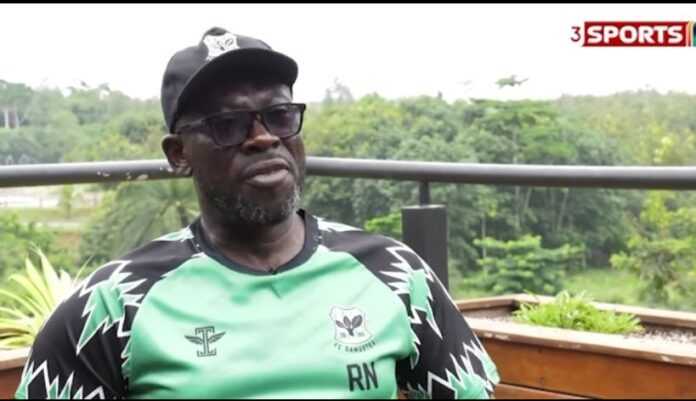Advertisement
Samartex
President
Richard
Nsenkyire
emphasizes
the
importance
of
transferring
players
from
Ghana’s
domestic
leagues
to
international
football
scenes.
However,
he
stresses
that
such
transfers
should
not
be
rushed.
Nsenkyire
advocates
for
a
gradual
progression
in
a
player’s
career,
suggesting
they
should
first
gain
experience
in
Ghana,
then
in
Africa,
before
moving
to
the
global
stages.
While
he
supports
the
current
transfer
policies
of
clubs,
he
insists
that
players
should
only
move
when
they
are
truly
ready.
“I
always
want
to
give
my
players
the
opportunity
to
play
in
Ghana,
then
Africa
before
they
move
on
to
play
anywhere
in
the
world.
I
support
the
transfer
policy
of
clubs
lately
but
I
believe
the
players
should
move
at
the
right
time,”
Richard
Nsenkyire
revealed
in
an
interview
with
3Sports.
The
Ghanaian
football
landscape
has
been
facing
challenges
due
to
financial
constraints,
leading
to
a
significant
exodus
of
talented
players
to
foreign
leagues.
This
trend
has
had
a
detrimental
effect
on
the
quality
of
the
Ghana
league.
Nsenkyire
criticizes
the
practice
of
mass
transfers
after
just
one
season,
arguing
that
players
need
time
to
develop
to
a
certain
level.
“I
don’t
believe
in
the
mass
transfer
of
players
after
just
a
season
because
I
believe
a
player
must
attain
a
certain
level.
This
is
because
when
you
leave
the
shores
of
this
country,
you
have
to
command
a
first-team
place
where
you
are
moving
to
and
bring
a
trophy
and
not
just
for
the
money.
Players
who
leave
should
be
able
to
represent
the
Black
Stars
at
any
point
in
time,”
Nsenkyire
stated.
The
issue
of
player
transfers
from
Ghana’s
domestic
leagues
to
international
scenes
presents
both
opportunities
and
challenges.
While
it
offers
players
the
chance
to
advance
their
careers
and
earn
better
wages,
it
also
risks
depleting
the
local
league
of
talent.
Nsenkyire’s
approach
advocates
for
a
balanced
strategy
that
prioritizes
player
development
and
readiness
over
hasty
transfers.
This
perspective
could
potentially
lead
to
more
sustainable
growth
for
both
individual
players
and
the
Ghanaian
football
ecosystem
as
a
whole.
The
challenge
moving
forward
will
be
to
find
ways
to
nurture
talent
locally
while
still
allowing
for
international
opportunities,
ensuring
that
when
players
do
move
abroad,
they
are
fully
prepared
to
succeed
and
represent
Ghana
on
the
global
stage.


